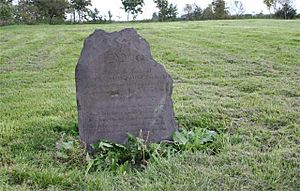St Peter's Church, Flawford facts for kids
Quick facts for kids St. Peter's Church, Flawford |
|
|---|---|
 |
|
| Country | United Kingdom |
| Denomination | Church of England |
| Website | flawford.org.uk/index.htm |
| History | |
| Dedication | St. Peter |
| Architecture | |
| Closed | 1718 |
| Demolished | 1779 |
| Administration | |
| Parish | Flawford |
| Diocese | Diocese of Southwell |
| Province | York |
St. Peter's Church in Flawford was an old church that belonged to the Church of England. It was located in a place called Flawford in Nottinghamshire, England. This church is no longer standing today.
Contents
What Happened to the Church?
St. Peter's Church was closed down in 1718. Later, in 1779, the church building was completely taken apart. This is called being demolished.
The Discovery of Ancient Figures
During the demolition in 1779, something very special was found. Workers discovered three old figures made from Nottingham alabaster. Alabaster is a soft, white stone that was often carved into beautiful sculptures in the Nottingham area.
These figures showed:
- Our Lady (another name for Mary, the mother of Jesus)
- St. Peter (the saint the church was named after)
- A bishop (an important leader in the church)
People believe these figures were hidden around 1539. This was during a time called the Dissolution of the Monasteries. During this period, King Henry VIII closed down many churches and monasteries in England. People might have hidden valuable religious items to protect them.
Today, you can see these amazing figures. They are kept safe at the Nottingham Castle Museum.
A New Church Takes Its Place
After St. Peter's Church in Flawford was demolished, a new church took its place. This new church was the chapel of St. Mary in Ruddington. It became the main church for the area. It also took on the name of the old church, becoming St. Peter's Church, Ruddington.
Exploring the Old Site
Many years later, in 1967, people became interested in the site of the old church. The Nottinghamshire County Council allowed the Ruddington Local History Society to dig up the area. This is called an excavation.
These excavations took place for many years, from 1967 to 1984. Archaeologists and historians carefully dug through the ground. They wanted to learn more about the old church and the people who used to worship there.
Images for kids


